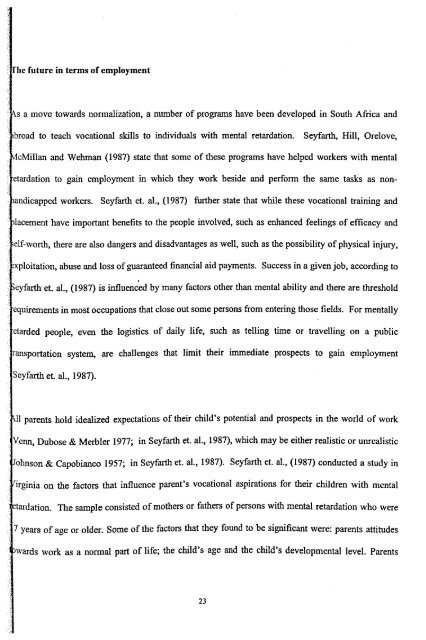attitudes of parents towards their mentally retarded children: a rural ...
attitudes of parents towards their mentally retarded children: a rural ...
attitudes of parents towards their mentally retarded children: a rural ...
Create successful ePaper yourself
Turn your PDF publications into a flip-book with our unique Google optimized e-Paper software.
he future in terms <strong>of</strong> employment<br />
s a move <strong>towards</strong> nonnalization, a number <strong>of</strong> programs have been developed in South Africa and<br />
broad to teach vocational skills to individuals with mental retardation. Seyfarth, Hill, Orelove,<br />
cMillan and Wehman (1987) state that some <strong>of</strong> these programs have helped workers with mental<br />
etardation to gain employment in which they work beside and perfonn the same tasks as non-<br />
andicapped workers. Seyfarth et. aI., (1987) further state that while these vocational training and<br />
lacement have important benefits to the people involved, such as enhanced feelings <strong>of</strong> efficacy and<br />
elf-worth, there are also dangers and disadvantages as well, such as the possibility <strong>of</strong> physical injury,<br />
xploitation, abuse and loss <strong>of</strong>guaranteed financial aid payments. Success in a given job, according to<br />
.<br />
eyfarth et. aI., (1987) is influenced by many factors other than mental ability and there are threshold<br />
equirements in most occupations that close out some persons from entering those fields. For <strong>mentally</strong><br />
etarded people, even the logistics <strong>of</strong> daily life, such as telling time or travelling on a public<br />
ransportation system, are challenges that limit <strong>their</strong> immediate prospects to gain employment<br />
Seyfarth et. aI., 1987).<br />
11 <strong>parents</strong> hold idealized expectations <strong>of</strong> <strong>their</strong> child's potential and prospects in the world <strong>of</strong> work<br />
Venn, Dubose & Merbler 1977; in Seyfarth et. al., 1987), which may be either realistic or umealistic<br />
ohnson & Capobianco 1957; in Seyfarth et. aI., 1987). Seyfarth et. aI., (1987) conducted a study in<br />
irginia on the factors that influence parent's vocational aspirations for <strong>their</strong> <strong>children</strong> with mental<br />
tardation. The sample consisted <strong>of</strong>mothers or fathers <strong>of</strong>persons with mental retardation who were<br />
7 years <strong>of</strong> age or older. Some <strong>of</strong> the factors that they fonnd to be significant were: <strong>parents</strong> <strong>attitudes</strong><br />
Wards work as a nonnal part <strong>of</strong> life; the child's age and the child's developmental level. Parents<br />
23
















